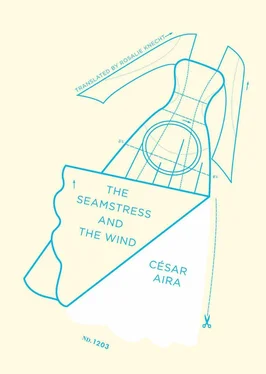She climbed in, legs first. When she let go she fell further than expected. She slid down one of the screens, which was on an incline, being attached by hinges to the back wall of the cab. In this highway bedroom she could now see what she had heard so much about. There were two beds very close together, both unmade. The disorder and filth were indescribable: comic books, clothes, dissected birds, knives, shoes. . A lit candle on the bureau illuminated the little room. For a lost woman, alone, like Delia was, such an atmosphere could have presaged anything. Part of her consciousness knew that, and another part was occupied with trying to see what would happen next, and that part took the initiative: she went through one of the two doors at random, crossed a room full of junk she didn’t look at and went through another door, into a small room with leather armchairs. She stopped there, looking at them in disbelief. There was no light here except what came through an open door, through which she could hear noises. The room had four doors, one on each side. They were all open. She glanced into the darkest one, which led to a hallway, and then the next: an office, with a great roll-top desk, where the disorder and filth of the bedroom were repeated. She crossed the room and went out through the door on the other side, where she found herself in a vestibule with chairs. And three doors. She went through the first on the left: an unoccupied bedroom, with the bed made. Actually it seemed less like a bed than a kind of low, elastic table. . There, also, was another door. She noticed, in retrospect, that it was the same in all the rooms, as if someone had been preoccupied with achieving maximum circulation. The result was that she was lost. She went on, and came somehow to the kitchen, which was the source of the light that spread throughout the whole labyrinth.
Here she thought the moment of truth had come, but there was nobody there. The burner was lit however, and two frying eggs crackled in the pan. The cook must have gone out for a moment, maybe in search of her, if he’d heard her. A large Petromax lantern cast a blinding light through the bastion of containers and foodstuffs. The pile of dirty dishes was incredible, and there were scraps thrown everywhere, even stuck to the walls and ceiling. A summary glance at the pan indicated that the eggs were almost perfect. On the counter, half a bottle of red wine and a glass. She lost her nerve and hurried out: she burst into the room she’d been in before, which seemed different to her now, as a new odor redoubled her trembling. Following a spiral of smoke with her eyes, she saw that in the ashtray on the end table was a recently lit Brasil cigarette. But there was still no one there. . How strange.
Delia’s aversion to tobacco smoke was extreme and fairly inexplicable. She couldn’t conceive of smoking inside a house. She had managed to get her husband to give up the habit when they married, a minor but nonetheless remarkable miracle. To a certain extent, she’d forgotten about it. She stood watching with incredulous horror as the smoke rose in the supernatural stillness of the room.
Chiquito came in through the door from the hallway and leaned down to pick up the cigarette. He was in boxer shorts and an undershirt, hairy, unkempt, and with the face of a man who had few friends. He went into the kitchen.
He came back almost immediately with the fried eggs in the pan. He crossed the room and exited through the same door he’d come from before. . At the end of the hall there was a dining room. Delia, peering out from behind the chair where she’d hidden, saw him sit down at the table, empty the frying pan over the plate and settle down to eat. She recognized him, and the surprise paralyzed her. In an instant, and without being any kind of intellectual, she was suddenly inspired to summarize the situation in an epigrammatic inversion of what she’d been saying up until now: in fact it was she, Delia herself, without meaning to, who had played a dirty trick on her own destiny.
Suddenly Chiquito let out a yelp. He’d put a whole egg in his mouth without remembering to take the cigarette out from between his lips, and the ember had burned his tongue. He spat out a jet of viscous yellow and white stuff, splattering a woman seated across from him. It was Silvia Balero, who had undergone a pronounced transformation since her last fitting with the seamstress: she was black. Down her black face, chest and arms ran the egg slobber, but she didn’t move a muscle. She looked like an ebony statue. Chiquito ran out groaning into the hallway and came back with a band-aid on his tongue. He drank several glasses of wine in a row. Miss Balero remained immobile, unblinking, and completely covered in that bruised black color. The truck driver finished his dinner, peeled an orange and threw the skin carelessly on the floor, and finally lit another cigarette. Through all of this he’d been talking to his guest, but with guttural, incomprehensible words. The black woman shook herself at intervals and let out some senseless phrases. It was incredible that a natural blonde with such a white complexion had taken on that dark veneer overnight. Chiquito, his accident already forgotten, was roaring with laughter; he seemed happy, not a care in the world. .
Until he lit his third or fourth after-dinner Brasil cigarette and Delia, behind the armchair, couldn’t help a sigh or little cough of irritation (the air was becoming unbreathable): Chiquito heard her and turned his formidable bulk in a violent twist that made his chair creak as the legs scraped together. How strange that someone so solid had gotten that diminutive nickname: Chiquito. Surely they’d given it to him as a child, and it had stuck. To think of antiphrasis or irony would have been out of place given his background.
Delia crawled backwards to the closest door, and as soon as she thought she was out of sight she ran. Luckily there were exits everywhere. . But that very extravagance only contributed to her running around in circles within the labyrinth, and increased the risk of running straight into the hands of her pursuer. Delia had abandoned any idea of asking for refuge or help in getting home. Not from him, at least. She hadn’t had time to think, with all the surprises and fear, but it didn’t matter. She was discovering that one could also think outside of time.
Chiquito was bearing down on her, shouting:
“Who’s there, who’s there. .”
“At least he didn’t recognize me,” Delia said to herself, hoping even in her desperation to preserve their coexistence within the neighborhood. . if she ever got back there.
She was looking for the bedroom she’d first come in through, to get out by way of the hanging screens. . but she came out somewhere completely different, in a dark and intricate jumble of metal. She was helplessly caught in its twists and turns. As if the inertia weren’t enough, she insisted on continuing forward, sticking a leg in, and then another, an arm, her head. . It was the truck’s engine, asleep for the moment. . But what if it turned on? Those iron pieces, in motion, would grind her up in a second. . She felt something sticky on her hands: it was filthy black grease that covered her from head to toe. It was the finishing touch. She could hardly move, neither backward nor forward, caught in the machinery from all sides. . And Chiquito’s shouts and footsteps were getting closer, they boomed in the mastodonic pistons. . she was lost!
At that moment a great jolt shook everything. For a moment Delia feared the most horrible thing had happened: the engine was starting. But it was not that. The agitation multiplied, and the whole truck danced clumsily on its thirty wheels. A deafening whistle enveloped it and passed through the metal walls. All the smells came back to her, and then vanished. A current of cold air touched her.
Читать дальше












